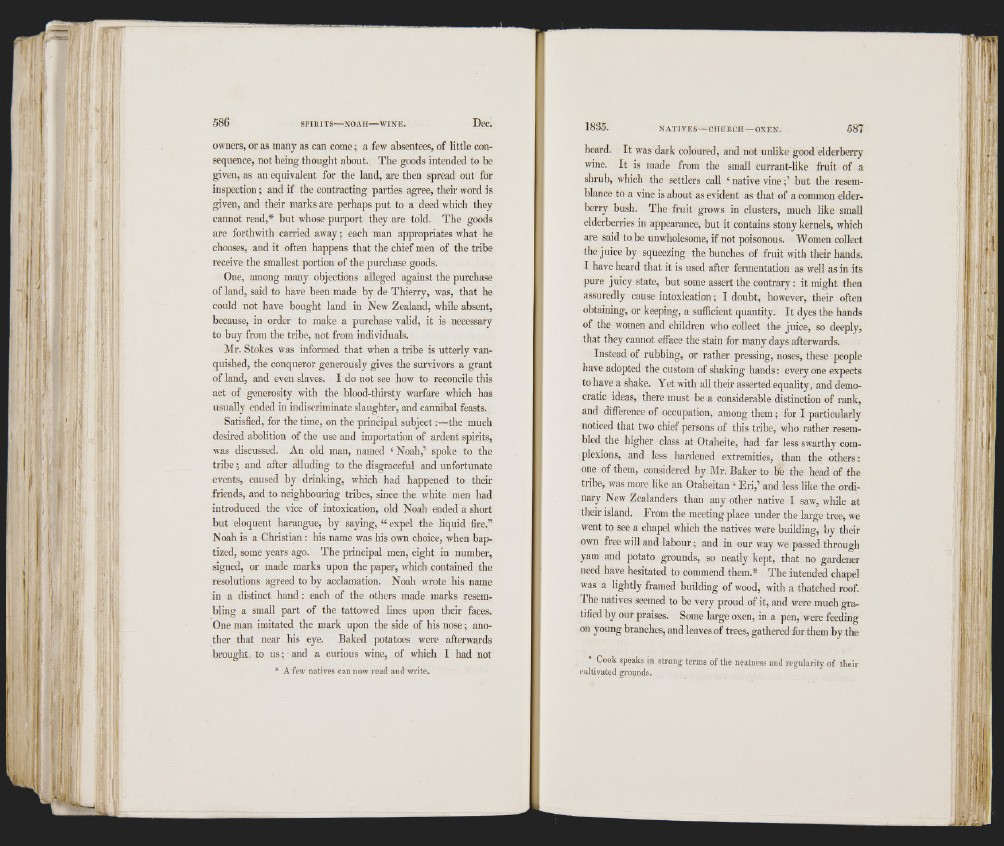
586
f i '1
I I 17 ‘i , 1 '
: i
f ' 1 '
p/i u
K . '1 ll j::.' 1 1r
f
owners, or as many as can come; a few absentees, of little consequence,
not being thought about. The goods intended to be
given, as an equivalent for the land, are then spread out for
inspection ; and if the contracting parties agree, their word is
given, and their marks are perhaps put to a deed which they
cannot read,* but whose purport they are told. The goods
are forthwith carried away; each man appropriates what he
chooses, and it often happens that the chief men of the tribe
receive the smallest portion of the purchase goods.
One, among many objections alleged against the purchase
of land, said to have been made by de Thierry, was, that he
could not have bought land in New Zealand, while absent,
because, in order to make a purchase valid, it is necessary
to buy from the tribe, not from individuals.
Mr. Stokes was informed that when a tribe is utterly vanquished,
the conqueror generously gives the survivors a grant
of land, and even slaves. I do not see how to reconcile this
act of generosity with the blood-thirsty warfare which has
usually ended in indiscriminate slaughter, and cannibal feasts.
Satisfied, for the time, on the principal subject:—the much
desired abolition of the use and importation of ardent spirits,
was discussed. An old man, named ‘Noah,’ spoke to the
tribe; and after alluding to the disgraceful and unfortunate
events, caused by drinking, which had happened to their
friends, and to neighbouring tribes, since the white men had
introduced the vice of intoxication, old Noah ended a short
but eloquent harangue, by saying, “ expel the liquid fire.”
Noah is a Christian : his name was his own choice, when baptized,
some years ago. The principal men, eight in number,
signed, or made marks upon the paper, which contained the
resolutions agreed to by acclamation. Noah wrote his name
in a distinct hand : each of the others made marks resembling
a small part of the tattowed lines upon their faces.
One man imitated the mark upon the side of his nose; another
that near his eye. Baked potatoes were afterwards
brought to us; and a curious wine, of which I had not
• A few natives can now read and write.
heard. It was dark coloured, and not unlike good elderberry
wine. It is made from the small currant-like fruit of a
shrub, which the settlers call ‘ native vine;’ but the resemblance
to a vine is about as evident as that of a common elderberry
bush. The fruit grows in clusters, much like small
elderberries in appearance, but it contains stony kernels, which
are said to be unwholesome, if not poisonous. ’Women collect
the juice by squeezing the bunches of fruit with their hands.
I have heard that it is used after fermentation as well as in its
pure juicy state, but some assert the contrary : it might then
assuredly cause intoxication; I doubt, however, their often
obtaining, or keeping, a sufficient quantity. It dyes the hands
of the women and children who collect the juice, so deeply,
that they cannot efface the stain for many days afterwards.
Instead of rubbing, or rather pressing, noses, these people
have adopted the custom of shaking hands: every one expects
to have a shake. Yet with all their asserted equality, and democratic
ideas, there must be a considerable distinction of rank,
and difference of occupation, among them; for I particularly
noticed that two chief persons of this tribe, who rather resembled
the higher class at Otaheite, had far less swarthy complexions,
and less hardened extremities, than the others :
one of them, considered by Mr. Baker to be the head of the
tribe, was more like an Otaheitan ‘ Eri,’ and less like the ordinary
New Zealanders than any other native I saw, while at
their island. From the meeting place under the large tree, we
went to see a chapel which the natives were building, by their
own free will and labour; and in our way we passed through
yam and potato grounds, so neatly kept, that no gardener
need have hesitated to commend them.* The intended chapel
was a lightly framed building of wood, with a thatched roof.
Tlie natives seemed to be very proud of it, and were much gratified
by our praises. Some large oxen, in a pen, were feeding
on young branches, and leaves of trees, gathered for them by the
Cook speaks in strong terms of the neatness and regularity of their
cultivated grounds.
• r
i l
I A
1